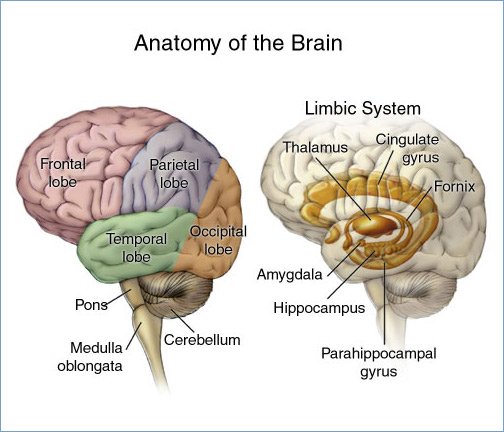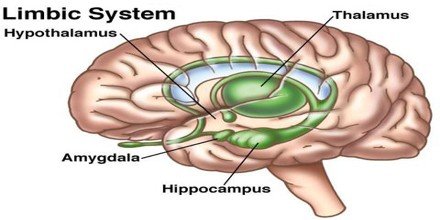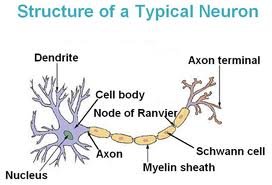Picture the brain

The brain looks a bit like a giant crinkled rubbery mushroom, with the average adult brain weighing about 3 lbs 5 oz (1.5kg). Your brain is divided into two hemispheres: the left and the right. These are linked by a central processing unit called the corpus callosum. Each half is split into four more compartments:
- At the very back is the occipital lobe, which handles much of your visual sense.
- Just behind each ear are the temporal lobes, which are involved in the organization of sound, memory, speech, and emotional responses.
- At the top of the brain are the parietal lobes, which handle sensations, such as touch, body awareness, pain, pressure, and body temperature. They also help you with spatial orientation.
- Behind the forehead are the frontal lobes, which are considered the home of our personality. The uppermost part of the frontal lobes is involved in solving problems, activating spontaneous responses, retrieving memories, applying judgement, and controlling impulses. It also modulates our social and sexual behaviour. This area is more developed in humans than in any other animals.
The limbic system

Inside the ridges and grooves of each hemisphere lie a set of forming what is known as the limbic system. This system includes the amygdala, hypothalamus, thalamus, and hippocampus.
These parts activate our emotions, appetites, instincts, pain and pleasure sensations, and other drives that are essential to survival. The amygdala activates emotional responses, such as fear or euphoria, while the hypothalamus is the control center for brain-to-body, body-to-brain messages, causing, for example, blood pressure to rise when we are agitated. The thalamus receives auditory and visual sensory signals and relays them to the outer layer of the brain, known as the cerebal cortex, where the information is processed. The hippocampus is critical to learning and remembering spatial layouts. At the very back of the brain lies the cerebellum, which handles movement and balance and, along with the brain stem, is the part of the brain that evolved first, inherited from our primeval ancestors. It keeps us alive by controlling our involuntary body functions, including breathing and digestion.
What are neurons?

Neurons are the cells in the nervous system that transmit information by electrochemical signalling. They are the core components of the brain and the spinal cord. Specialized types of neurons, including sensory neurons and motor neurons, allow us to feel and act respectively. All neurons respond to stimuli, and communicate the presence of stimuli to the central nervous system, and then to the relevant part of the brain, which processes the information and sends responses to other parts of the body for action. Each neuron is connected to approximately 10 000 others by frondlike tendrils. The dendrites are the "receivers", and axons, the "transmitters". The neurons are not actually joined together but touch each. When neurons communicate, the gaps at the touch points are filled with neurotransmitters, chemicals that carry pulses or "electrical messages". The myelin sheath acts as an insulator and increases the speed and efficiency of the pulses.
The sum of its parts

Each hemisphere deals with different types of mental activity. The left side deals with logic, numbers, language, lists and analysis - the so-called reasoning activities. The right side is more visual, and deals with imagination, colour, spatial awareness, pattern, recognition, and making sense of the abstract.
Most people seem to have a dominant side. The crucial word here is "dominant". It's a natural preference, and not an absolute. What this means is that when you're learning something new, your brain prefers to learn in a certain way. It is not so much that you are biologically right-brain or left-brain dominant, but that generally you've become comfortable with applying one side more than the other. The truth is that in practice you are always using both sides of the brain simply because most tasks demand it, so you shouldn't get too hung up on this division.
Source: https://books.google.gr/books?id=WfRGaPhyoisC&pg=PA14&lpg=PA14&dq=%22The+brain+looks+a+bit+like+a+giant+crinkled+rubbery+mushroom%22&source=bl&ots=UIquDh9Ogb&sig=2DMU8sZyxbgifMAga86y9MjNhi0&hl=el&sa=X&ved=0ahUKEwjdx8Di8dXXAhUKIJoKHV1hBVgQ6AEIOjAI#v=onepage&q=Each%20hemisphere%20deals%20with%20different%20types%20of%20mental%20activity&f=false
Not indicating that the content you copy/paste is not your original work could be seen as plagiarism.
Some tips to share content and add value:
Repeated plagiarized posts are considered spam. Spam is discouraged by the community, and may result in action from the cheetah bot.
Creative Commons: If you are posting content under a Creative Commons license, please attribute and link according to the specific license. If you are posting content under CC0 or Public Domain please consider noting that at the end of your post.
If you are actually the original author, please do reply to let us know!
Thank You!
More Info: Abuse Guide - 2017.